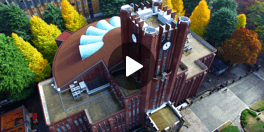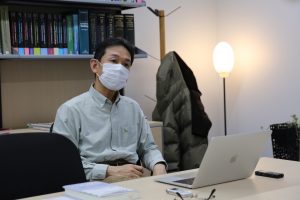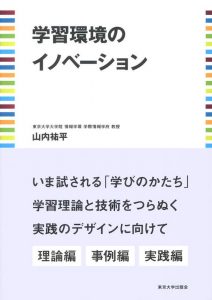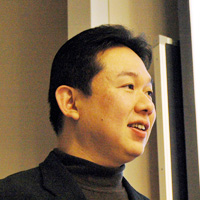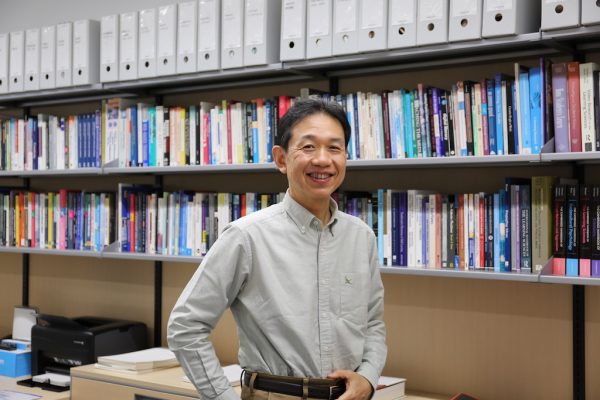
April 30, 2021
【教員インタビュー】 山内祐平教授(前編)Interview with Prof. YAMAUCHI, Yuhei (Part 1)
ここからがまさに学環・学府の出番
ー新しい研究領域を育てるための種蒔きが課題にー
2021年4月に新学環長・学府長へ就任された山内先生にお話を伺いました。パンデミックとご専門の学習環境デザイン論について、また21年目に突入する学環・学府の今後の課題と目標について語っていただきました(取材日2月18日)。
(English translation of the interview follows)
ー 先生のご研究について簡単にご紹介ください。
ICT(情報通信技術)を使って新しい学習環境をつくる研究をしています。例えば今まさにコロナ禍で焦点になっていますが、オンラインだけでも深い学習ができるようにするためにはどうしたらよいか、オンライン学習と対面学習をどう組み合わせれば学習の成果が上がるのかなどの研究をしています。
ー 昨年はパンデミックのために全世界が短時間で学習環境を強制的に変えさせられてしまいました。学習環境の専門家としてどうご覧になりましたか。
今回起こったのは、対面でやっている教育活動を情報通信技術を使って置き換えることであり、優先順位はまず「学びを止めるな」でした。学習の機会を保障するために、東京大学も他の教育機関もみんな努力をしてオンライン授業をどんどん展開していった。東大の全教員がオンラインで講義をするということは、東京大学始まって以来のことです。教員や学生がICTを使えばこういうことができるということが分かったという意味では、歴史的な事件だったと思います。
しかし、コロナが収まったらオンライン授業はやめるのかというとそう単純ではない。今はみなさん「対面の方がいいけど、コロナのせいで仕方なくオンラインを使っている」という状況だと思います。でも本質的には、対面でやった方がいいところもあるけれど、実はオンラインでやった方がより効率的な部分もあるし、オンラインと対面を組み合わせるとよりよい授業ができるかもしれない。これからはむしろこの歴史的事件をきっかけにして、よりよい学習環境になるようにみんなが頑張っていく時代になるでしょう。
私の専門領域のみならず、コロナで情報通信技術はいろんな領域でクローズアップされています。どの領域でも急に対応せざるをえず、とりあえず対面でのやり方をそのままZoomなどで置き換えた、というのが今の状態でしょう。でもそれは決して理想的な状況ではない。本質的に情報社会のあり方について、何が望ましいのかを考えた上で、ICTの使い方や、対面コミュニケーションの価値について議論していかなければいけないと思います。
− コロナが終息する気配はまだ見えませんが、終わった先に、大学での学びのなかにオンラインはどういう形で残っていくと思われますか。
大学では多くの先生方が大講義、つまり先生が前に立って数百人の学生を相手にする講義については、オンラインの方が出席率も高く、チャットでたくさん質問があり相互作用性も確保できると感じています。大講義は、基本的にはオンラインでそのまま継続するという形になっていくのではないかと考えています。
一方で、少人数で濃密に議論する活動やグループワークでモノをつくるといった活動は、オンラインではやりにくいということも明らかになりました。もちろんZoomのようなテレビ会議システムは、昔に比べれば遥かによくなってはいるとはいえ、遅延が発生するので、複数話者が重なりながら話すのは困難です。トランシーバーみたいに、だれかがしゃべり終わったら次の人が話す、みたいな感じで、やっぱり対面同様のインタラクティブにはならない。ほかにも、フィールドワークのような現場に行く活動は、やはり対面が非常に重要であるということをみなさんが痛感した。対面でやった方がよいものとオンラインでやった方がよいものをどう組み合わせて、新しい学習環境にしていくのかということが重要になってくるだろうと思います。
− コロナ禍で新たに始められたご研究はありますか。
私はワークショップの研究もしていますが、ワークショップというのは非常にインタラクティヴィティが高く、やはり対面の方がやりやすい。それをどうやってオンラインでやっていくのかを研究しています。2020年4月の緊急事態宣言のころは、学校もしばらくの間止まってしまい、本当に一人で教科書を読んだり、問題集をやったり、場合によっては動画やテレビを見たりぐらいしかできないような子どもたちがいた。彼らがお互いコミュニケーションしながら創造的なことを学ぶような機会を現時点で保障するためには、例え10割じゃなくて8割でも、ワークショップの醍醐味をオンラインでどう再現できるのか、ということを考えました。コロナ禍で子どもたちが集まれなくなってしまったけれど、やはりそういう学習も非常に重要ですから。情報学環・福武ホールでずっと共同研究してきたSCSKという企業の社会貢献プログラム「CAMP」と一緒に、子供向けのオンライン・ワークショップ・プログラムを開発し、多くの子供たちが学んでいます。
− 誤解を恐れずに言えば、先生のご研究にとって2020年の出来事は、いいチャンスとなったような気もしますが、いかがでしょうか。
チャンスというより、重要性を再認識したという感じでしょうか。身が引き締まったという言い方もできますね。今まではそんなに一般的ではない領域で専門家としてやっていたわけですが、みんながICTを使うようになったことで、求められるものがどんどん重くなっている感じがします。
− コロナは学府の学生たちにどのような影響を及ぼしたとご覧になっていますか。
今回、大学や大学院で学ぶ人たち、特に大学の1年生や大学院の1年生など、最初にコミュニティに入ってきた人が、人間関係がつくれなくて孤独になってしまい、学習をするモチベーションを維持するのが非常に難しくなりました。学府も同じで、特に修士1年で入ってこられた方が・・。私の研究室もそうですが、オンラインでしかゼミができず、緊急事態宣言で研究室にも来れなくて、同級生との関係が上手に作れなかったり、自然に研究室の中でできていた、上から下へのノウハウの伝達みたいなことが難しくなってしまった。みなさん非常につらい1年だったと思います。
実は授業だけをとってみると、学環・学府はほぼスムーズに、大きなトラブルもなくオンライン授業ができましたし、知識伝達という意味ではうまく乗り切れたと思うんです。けれども、コミュニティ形成の面では課題が残されています。学生だけではなく、教員側も教授会で集まった時に隣の人と話す、みたいなことが全然なくなっちゃったんですね。そうすると、新しく来られた方の研究内容を知るというようなことも、難しくなってしまった。そこはこれからチャレンジしなきゃいけないところだと思っています。もちろん、活動制限指針のレベルは東大全体で決めることで、学環・学府だけでできることとできないことがありますが、そのレベルの中で最大限人のつながりが確保できるように、みなさんと相談しながら努力していきたいと思っています。
今回痛感したのは、大学院で研究することがコミュニティに根差した行為であって、人と人とのつながりがないとうまくいかないということです。いろんな人たちとのつながりの中で新しいアイディアが出てきたり、それをブラッシュアップしていくということが行われている。もちろんその一部はICTで代替できますけれど、一番根本の人間関係をつくる部分に関して言うと、やはり対面の良さはある。
もうひとつ言うとしたら、空間が持つ力。ICTを使うと仮想的に同じ場を共有することはできるけれど、自然な形で対話できるのって本当は幸せなことだったんだなということを、今回みんないろんなところで実感していると思うんです。一緒にお酒飲んだりできるのは、とても豊かで人間的な活動だったのだなということを。だから逆に言うと、それが身に沁みたから、今後は対面コミュニケーションを大事にする時代になっていくのではないか。
歴史的にも感染症のアウトブレイクが起こった後は、やはり人間同士のつながりを大事にする文化が花開いたという事例があります。今噛み締めている対面の大事さを基盤とする新たな時代が来る。それは当然オンラインを否定するわけではなくて、オンラインと対面のよいところを組み合わせた新しい様式になるでしょう。
− 昨年度は研究をする上で、例えばインタビューや参与観察をしようとしてもできなかった人が結構多かったと思われます。ご存知の範囲でかまいませんが、昨年度の修論の研究に関して、学生はどのように取り組んだでしょうか。
いくつかパターンがあります。やはり介入型の研究が難しいので、調査型の研究に切り替えるという例はありました。あとは介入型の研究をやるけれど、頑張ってオンラインでやってみる、というようなケースもありました。両方重要だと思います。調査研究は調査研究で、逆にコロナ禍だからこそ足元を固めて、いろんな知見を集約するというのが我々アカデミアの仕事ですから、調査研究も大事な一歩になります。オンラインでの介入研究というのも、今後多分オンラインでどうやって価値が高い介入をしていくのかというのは重要なテーマだと思うので、ベクトルは違いますが、学府の院生は頑張って研究をしていると思っています。
人間はたくましいので、厳しい状況でも前向きに生きようとするし、前向きに学ぼうとする。もちろん大変なことではありますが、探せばやれることはたくさんある。実は、昔から社会人で通信教育で学んでいる人って結構多いんですよね。放送大学もそうだし。郵便で教科書を送るところから始まった遠隔教育は100年ぐらいの歴史がある。対面でなくても学べることはあるということは歴史も証明しています。今学府の大学院生が前向きに学んで、新しい形を生み出していることが10年後、20年後に成果となってあらわれ、新しい領域が開拓されていくのではないかと期待しています。
(後編へ続く)
企画:ウェブサイト&ニューズレター編集部
取材・構成:金佳榮(特任研究員)、神谷説子(特任助教)
英文:デービッド・ビュースト(特任専門員)
The III/GSII’s time has now come:
New Dean envisions establishing the foundations for various new projects
We conducted an interview with Prof. Yuhei Yamauchi, who became Dean of the III/GSII in April 2021. In addition to expressing his views about the future of the III/GSII, he also talked about the pandemic and his own research on designing learning environments. (The interview was conducted on February 18th.)
Q. Would you give us a brief introduction to your research?
I am conducting research for the creation of new learning environments using information and communications technology. For example, I research how to enable deep learning using only online means and how to combine in-person learning with online learning to improve educational effectiveness. Now, with Covid-19, such things have become the norm.
Q. Last year, because of the pandemic, the whole world was forced to change its learning environment in a short period of time. How do you view this as an expert on learning environments?
On this occasion, we simply started doing online the same thing as we had previously been doing offline. The priority was simply to allow people to continue learning. Therefore, to guarantee educational opportunities, the University of Tokyo and other universities rapidly expanded online classes. Probably for the first time ever, the entire faculty have been conducting online classes. With so many people becoming aware of what can be achieved through the use of ICT, I think it is a very significant period in the history of the University of Tokyo.
However, it is hard to imagine that this will all simply end when the pandemic is over. I think the current situation is one in which most people still believe that in-person learning is better and view online learning as a necessary substitute while in-person classes cannot be held. But, fundamentally, although there are some areas where in-person is certainly better, there are also some instances where online is actually preferable. Furthermore, it may be possible to improve education and create a better learning environment by combining the two. As a result of this historical incident, I believe the time has now come for us all to make efforts to build a better learning environment.
Covid-19 has drawn attention to information and communication technology in a number of fields besides my own. In every field, the priority has been to respond quickly and find alternatives to face-to-face interaction using tools such as Zoom. However, this is certainly not an ideal situation. I think we need to consider more fundamentally what is desirable in an information society. On this basis, we should discuss how ICT is to be used, and where and for what purpose in-person communication should be used if at all.
Q. There is still no end in sight to the pandemic, but when it does finally end, what role do you think online learning will still play in university education?
Large lecture classes, where a professor stands in front of 500 or so students, can actually be conducted more effectively online. Using online chat, students can send in their questions, thus achieving interactivity. I expect that such large lecture classes will continue to be held online.
On the other hand, I think it is clear that smaller classes, where the participants do something interactive, especially when they are doing an activity where they engage in small group discussions or create something through groupwork, are very difficult to conduct online. Remote meeting tools like Zoom do make it much easier than before, but latency makes simultaneous communication difficult. It is not truly interactive when people have to take turns to speak. As regards activities like fieldwork that must be done in a real place, we have all keenly felt the importance of doing things in person. I think it will be very important to consider how to combine things that are best done in person with things that are best done online in the creation of a new learning environment.
Q. Have you initiated any new research since the beginning of the pandemic?
I have been doing research on workshops. As one element of the learning environment, workshops have a very high degree of interactivity and are naturally best conducted in person. I have been investigating how they might be conducted online. When the state of emergency was announced in April 2020, schools were closed for a while. Many children were forced to read textbooks on their own, work on exercise books, or, in some cases, just watch videos or television. In order to guarantee their opportunity to learn creatively while interacting with each other in the present circumstances, I have been thinking about how to have something like an online workshop, even if not 100% at least 80%. Because of the pandemic, children can no longer meet each other, but that kind of learning is naturally very important. We have started an online workshop program for children in conjunction with an existing joint project we have been pursuing with a company called SCSK. It has been going very well.
Q. If I were to state it bluntly, it would seem that the events of 2020 have been a great opportunity for your research. How would you respond?
Rather than being an opportunity, it is more a case of being reminded of the importance. It would be more accurate to say that we have felt under pressure. In the past, it was just my own area of specialization, but now everyone has started using ICT and the demands have become greater and greater. In that sense, I feel an obligation to devote myself to it even more.
Q. How have you seen the pandemic impact students in the GSII?
All those studying at universities and graduate schools have faced the same difficult situation. It is especially difficult for those new to the community, such as first-year students, who have not been able to form human relations and have become isolated. This makes it difficult to maintain the motivation to study. It is the same in the GSII, especially for first-year master’s students. Among my own students, seminars have been held exclusively online. Students have not been able to come to the university and form relations with their classmates. The usual spontaneous transmission of know-how from seniors to juniors has become very difficult. I think it has been a very difficult year for everyone.
If we narrow the focus only to classes, the III/GSII has been able to conduct lessons online relatively smoothly almost without trouble. I think the formal transmission of knowledge has basically continued almost unhindered. However, when it comes to community formation, things have been much more difficult. We have not been able to have informal conversations with those seated next to us in the same room. This applies to faculty meetings as well as to students in classes. It has become very difficult to learn about the research contents of new faculty or students. This is a problem we must address from now on. There is of course a limit to what the GSII can do alone when the university as a whole decides to raise its activity restriction level to 1 or 0.5 or whatever. I want to consult with everyone to find ways to maintain the greatest possible amount of human interaction at that level.
This whole experience has made me painfully aware of the extent to which graduate research is so deeply rooted in community. It really does not go well without human relations. New ideas emerge and develop from interaction with other people. Some of this interaction can be replicated through the use of ICT, but when it comes to forming basic human relations, face-to-face communication still has the edge.
Another thing is the power of space. The act of sharing the same space with other people – well, I suppose it could be achieved virtually – and having conversations in the natural way is really something joyous. The present situation has made everyone very aware of this fact. There is something very rich and human about sitting together and drinking. Therefore, conversely, now that this has become clear to us, we will treasure it even more in the future.
After outbreaks of infectious diseases in the past, there have been great flowerings of culture emphasizing the importance of in-person interaction. When the current pandemic ends, rather than simply continuing with everything online, a new age and new culture recognizing the importance of in-person interaction will come. Of course, we will not totally negate the online, but I think the focus will be on how to combine the best of both forms of communication.
Q. It seems that many people who had planned to do interviews or participant observation research were unable to do so last year. To the extent of your knowledge, how did students tackle the situation in their master’s thesis research?
There were several patterns. Intervention-type research is obviously difficult, so some switched to doing surveys instead. There are also those who did survey research in preparation for when they were able to do intervention research again. Then, some students persisted with plans for intervention research but found ways to do it online. I think both types of research are important. Precisely now during a pandemic, we have a duty as academics to gather knowledge from the grassroots, and surveys are an important first step. One important topic for future research will be how to conduct high-value interventions online. They may have taken many different trajectories, but the students in the GSII have been working very hard.
People are actually resilient. They try to push ahead with life even under harsh circumstances. They somehow find ways to keep learning and doing research. Of course, there is hardship, but there are still many things you can do if you make an effort. Many people in the past continued studying while working using remote learning environments. There is also the Open University. Remote education began about 100 years ago with the introduction of postal services. Many things can be learned even without meeting in person, and the historical record proves this. The valiant efforts made by GSII graduate students at this time will surely leave a legacy whose benefits will be reaped ten or twenty years from now. We can surely expect new areas to be opened up.
(Continue reading Part 2)
Interviewers: Kayoung Kim (Project researcher), Setsuko Kamiya (Project assistant professor)
Translation: David Buist (Project senior specialist)
主担当教員Associated Faculty Members
教授
山内 祐平
- 文化・人間情報学コース
- アジア情報社会コース
Professor
YAMAUCHI, Yuhei
- Cultural and human information studies course
- ITASIA Program

